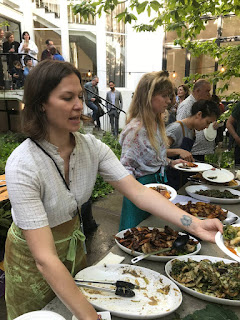The Travelling Farm Museum of Forgotten Skills is a participatory, mobile museum where artists, citizens, and farmers share stories about their relationship to food and the landscape. Comprised of The Outsiders collective in collaboration with Casco Art Institute, they operate vehicles that physically and symbolically convey ideas about food sovereignty, ecology, and relationality to different local publics. By visiting farms and food producers and connecting heritage skills to present challenges, they create tools for listening and dialogue that connect environmental care with art and critical pedagogies.
Travelling Farm Museum’s latest iteration centers around the figure of the mooswief (Limburg dialect for “vegetable woman”), an expression used to describe rural women who in the past would come to Maastricht to sell their goods at the weekly market. Each year a larger-than-life marionette of the mooswief is hoisted up a pole in the city’s market square to inaugurate the Carnival festive season. Just as Carnival celebrates the return of light and a renewed spring, the mooswief has come to symbolize fertility and a deep connection to the land. Shepherding her spirit along this journey are memories and lore of sjellik, a once ubiquitous but now largely disappeared local cruciferous vegetable.
Formerly a wagon covered in mirrors to blend into the surrounding landscape, the Travelling Farm Museum of Forgotten Skills now bears a kaleidoscopic image of the Maastricht city border and its neighboring farmlands. Accompanied by a soundscape of the countryside, The Outsiders move as mooswiefs through the public square, engaging those around them in a conversation about food, heritage, and the possibility for a common future.


















